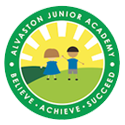Reading Implementation at AJA
Reading: Implementation
At Alvaston Junior Academy, the curriculum is designed to ensure coverage and develop skills progressively. We use Reading VIPERS throughout school to teach reading skills through six key areas: Vocabulary, Infer, Predict, Explain, Retrieve, and Summarise. In shared reading lessons, the teacher’s role is to make it clear what good readers do and encourage children to be actively involved in reading in the moment. At the start of every shared reading lesson, the children do a 2-minute speed read followed by associated questions, in order to increase reading stamina. During shared reading children read a text higher than the expected level for their year group in order to raise reading levels; within this lesson, they have the opportunity to read independently and work on comprehension skills. Reading skills and strategies are modelled, and discussion helps children to have a deeper understanding of texts. Shared reading has a specific focus; all abilities are included in discussions by differentiated questions and scaffolding techniques in order to ensure all children can access the text and questions. Children also continue to develop their reading fluency skills, building upon their phonics knowledge and skills. We recognise the importance of developing a rich and extensive bank of vocabulary, and therefore revisit the new vocabulary learnt at the beginning of each lesson.
Children with SEND may be taught in a smaller group but access the same learning as the other children in their class. Children in need of intervention are identified and extra sessions will be provided for them outside the daily timetabled shared reading session. Children in KS2 who need further phonic intervention work do so through targeted interventions, using Nessy software and Learn to Read. They are assessed regularly against the Letters & Sounds, in order to provide them with appropriate support.
It is a priority at our Academy to develop a reading culture: to create an environment where reading is valued, promoted and actively encouraged. Therefore, a range of different strategies are used throughout the year to engage the children in reading, such as: ‘hooked on books’- teachers reading books from the top 20 children’s book list. Reading challenges- read 8 books in 8 weeks. Celebration of World Book Day; creation of video book recommendations; Accelerated Reader year group challenges; and reading boosts using MyOn.
All classes are exposed to a daily class reader linked to the current topic, for pleasure; to excite and engage the children, and to expose them to new and varied vocabulary. All books shared with children are age appropriate and matched to the level of the class. Every child will experience a full range of reading experiences during their time in school from reading with an adult 1-2-1, reading in small groups of similar ability children and as part of a whole class lesson. Children are given the opportunity and encouragement to read independently in order to build confidence, stamina and fluency, as well as develop their experience of a range of books and authors. Children have access to a wide range of books including fiction and non-fiction via their class reading corners, the school library (Bookingham Palace) and from texts brought in from home.
Children are given a reading book at an appropriate level to take home and a reading record. Each time a child reads at home, a comment should be written by parent/ carer in their reading record; children’s individual reading at home is monitored by staff. Where children do not read regularly at home, teachers will arrange for them to read individually at school to classroom assistants or teachers. Reading records are collected weekly on a Friday. Those children that have read at least four times a week will receive a positive Dojo. Reading at home is encouraged and promoted through class incentives and parental engagement sessions.
At Alvaston Junior Academy, we use the Accelerated Reader program. A Star test is completed as a baseline, and then repeated termly; this gives the teachers the child’s Zone of Proximal Development (ZPD). Children read books from our library within their ZPD and then quiz after each book.
A whole school approach to assessment and record keeping is used – Target Tracker. Teachers will use their professional judgement to determine whether a child is working within age-related expectations, above or below. They will base their judgements on summative and formative assessments throughout each term. All children complete a termly reading assessment (either NFER test or KS2 previous SATs paper). When tests are used, care is taken to ensure that pupils are prepared appropriately for the test, and any barriers to accessing these is removed. Alongside this, teachers use their knowledge of children’s attainment in lessons using the National Curriculum statements on Target Tracker to assess

